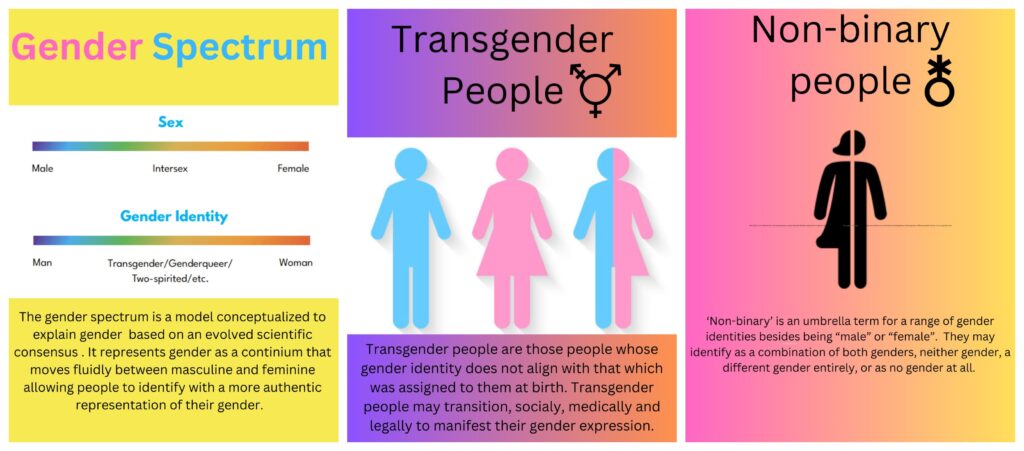Mental health care practitioners from the three metro cities of Delhi, Bengaluru and Mumbai have reported not having had adequate training when it comes to providing gender-affirming care.
About 60 percent of mental health professionals in a study reported not seeing gender affirming care being covered properly or at all as a part of their formal education as mental health professionals. The study was conducted by the Tata Institute of Social Sciences and published in September 2023. It studied 165 mental health professionals from the three metro cities of Delhi, Bangalore and Mumbai.
While 47 percent of mental health professionals reported having had transgender individuals approach them to receive gender transition assessment and referral letters for the same, 67 percent of them reported being approached by families of a transgender child seeking conversion therapy, with 34 percent of them stating that the trans person themselves approached them for conversion treatment.
Conversion treatment itself is widely regarded as pseudo-science by evidence-based medicine, with organizations such as the American Psychological Association (APA) speaking out against its dangers and its inefficacy. Legally, too, it is dubious with the Madras High Court passing a judgement to ban conversion therapy. The court also directed the National Medical Commission to include a curriculum inclusive of proper treatment of LGBTQIA+ people.
Some psychiatrists in Bangalore, who received training abroad in countries like the United Kingdom, reported feeling better equipped to treat and understand transgender patients.
“As I did my training in the United Kingdom, I had full exposure to training of these aspects, and have worked in many LGBTQIA+ groups,” Dr. Surya Prasad said. He has spent 22 years engaging in mental healthcare practice.

Katyayani Saksham, a social media content creator from Delhi, had issues with accessing proper therapy as a trans woman.
“My therapist was educated in a different era and the words and the terms he used were outdated. He can’t see transness as euphoric for people. He looked at it as just suffering you have to go through.”
She went on to say that she did not have that sort of trauma with having initially been a man. “Of course I had dysphoria, but I was very comfortable transitioning. I always had a nice life.”
Mental healthcare in general is well sought after, the study said. It explained that trans people face a lot of stress, depression and anxiety due to being a minority group that faces routine discrimination, abuse and violence. They are therefore often more in need of mental health services, turning to dangerous self-medicating practices like alcohol abuse to cope with the lack of support they receive from society and medical professionals.
“Gender affirmative care can be understood in two ways: general healthcare that is affirmative of the gender of the individual, and healthcare that aims to help folks be comfortable in identifying and expressing themselves as their gender,” Anirudh , a Bangalore-based queer political activist said. They went on to explain that gender influences every part of human existence in society, “from access to resources, to social perception, to experience of trauma and abuse.”
Trans people have also expressed difficulty in getting legal recognition, due to the complicated process put in place that requires mandatory therapy.
“Legally transitioning is very difficult, you need to consult two therapists to get a certificate to move forward with the legal name-changing process,” Saksham said.
She also stated that most trans people do not have the privilege and the resources to access therapy, in order to receive certification to access gender affirming care and legal recognition.
“How many trans women can pay Rs. 1400 for a sitting, twice a month and give Rs. 3000 a month for six months to get a certificate in place to get a name change? People can’t really spend that much in India,” Saksham said.
And due to the limited and archaic understanding about trans experiences from the therapists she had met, she said that she had to pretend to be deeply disturbed in order to receive gender affirming care.
“I had to go and say that I’m really depressed and suicidal and I want a new body in order to receive certification.” Saksham added.
Therapists on the other hand, don’t seem to have as many issues with treating patients.
“I was privileged enough to do my training from the National Institute of Mental Health and Neurosciences (NIMHANS). And in places like this, with an experienced and educated staff and tertiary care centres, we have adequate knowledge and expertise to treat trans patients,” Dr. Lakshmi Sravanti, who has been trained as a child psychiatrist and psychotherapist, said. She has had experiences with treating many trans children.
“It’s easy for me to establish a clinical rapport and establish a clear line of communication with the children,” Dr. Sravanti said.
Dr. Sravanti reported that she did not face much difficulty in treating trans patients.
“The challenges are usually with the parents, who may have trouble accepting their children’s identity, but I haven’t faced this as much when it came to parents from metro cities.”
But this does not seem to be the consensus among trans patients. Anirudh stated that as a non binary person, they found NIMHANS’s outlook and education lacking when it came to providing proper gender affirming care.
“I was speaking with a senior consultant at NIMHANS for a project we want to do on queer affirmative mental health care, and he said, ‘As a mental health professional, I don’t see the gender of my patients. I treat every person holistically as their own individual, so gender doesn’t matter’.”
They also expressed difficulty with accessing dignified and educated treatment from therapists in Bangalore.
“It’s a range of stuff—right from doctors who said things like, ‘hmm maybe your anxiety and depression is coming from your queer identity; you should try being hetero’ to total denial that trans people go through a variety of mental health issues due to social stigma.” Anirudh said.




